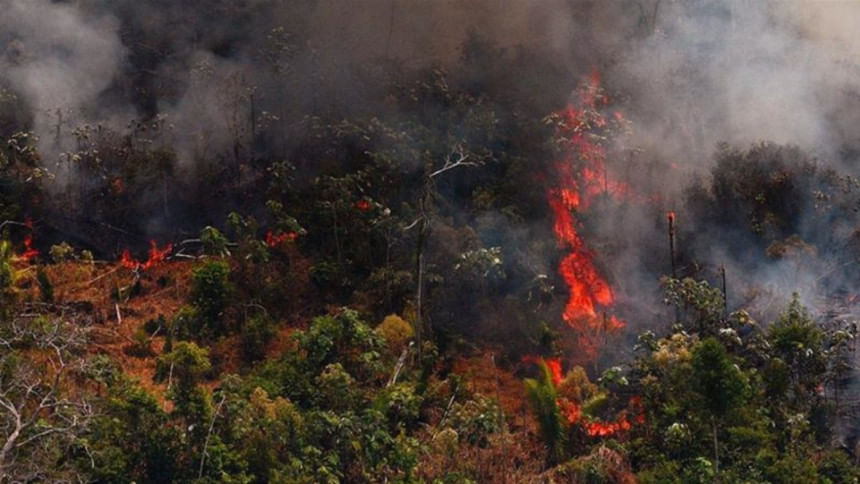What does it take for a tree to fall?

If a tree falls in a forest and no one is around to hear it, does it really fall? If another tree follows it, and then another, followed by a million others, and no one is around to hear the sound of their fall, do they really fall?
The Amazon has been burning for more than three weeks now, and only recently has it been able to secure its fair share of airtime. In fact, the Amazon has been burning since January at a rate unprecedented in its recent history—it has been estimated that there have been around 73,000 instances of fire in the Amazon since the beginning of the year, a more than 80 percent increase compared to the corresponding period of last year.
Over 750,000 square kilometres of the Amazon rainforest, spread across eight countries (Brazil, Peru, Bolivia, Columbia, Venezuela, Surinam, French Guiana and Guyana), have been lost since 1978, thanks to deforestation. 750,000 square kilometres is more than five times the size of Bangladesh. Every year, we lose a part of the Amazon, traditionally to agriculture and farming, and now to industrial activities and large-scale agriculture and cattle farming. Yet, it took us Sao Paulo's doomsday photos to take notice of it.
One might wonder though, why have the fires been so rampant this year. Since January, more than 1,330 square miles of the Amazon rainforest have been lost to fire—a 39 percent increase from the same period of last year.
The answer is simple: delusion, despair and desperation. Our "delusion" that the resources nature has bestowed upon us are fungible and will remain there, no matter how much we exploit them; our "despair" at a world that is still reeling from the economic meltdown of 2008; and the resultant "desperation" which has seen a spate of idiosyncratic leaders take the helm across the world, with the mandate of making their countries great again—at any cost, that is.
President Jair Bolsonaro of Brazil, also called "Tropical Trump", a right-wing political figure, had promised during the election campaign last year to open up the Amazon to economic development, meaning to make it available to quarters who want to exploit the fabled gold mines and use its resources for industrial gains. The result: the raging flames that are burning the lungs of the world.
Known as the carbon sink of the world, the Amazons is a key ally of the humans in combating climate change. According to data gathered from various sources, the Amazon rainforest produces six percent of the world's oxygen, stores 25 percent of the world's carbon, and houses 40,000 species of plant, 3,000 species of freshwater fish and over 370 species of reptiles. Around 25 percent of the medicines used worldwide are derived from plants that grow in the Amazon.
Once in office, Bolsonaro simply slashed the budget of Brazil's environmental enforcement agency by USD 23 million. Soon enforcement operations became less intensive, resulting in 88 percent more deforestation in June compared to the previous year—according to satellite data which Bolserano refused to acknowledge and fired the director of Brazil's National Institute for Space Research (INPE) for his troubles.
Among the many interesting narratives that have come from Bolsonaro in the aftermath of the recent Amazon fires, he blamed everyone but himself for this ecological disaster. First, the Brazilian president chided the West for interfering in the "internal" matters of Brazil; then he blamed the environmental NGOs working towards the conservation of the Amazon for having lit the fire themselves, as an act of sabotage in reaction to the president having cut their funds; and finally, he conceded that Brazil does not have the resources required to contain the fire, and when the situation spiralled out of control, he sent the military to the Amazon to try and extinguish the flames.
Of course, this systematic and destructive exploitation of shared communal, or in the case of Amazon, global resources is not a new phenomenon, neither is it limited to any specific part of the world. The tragedy of the commons is most likely older than the great Greek tragedies, a recurring theme of our history, an ingrained human condition.
The Sundarbans in our very own backyard is undergoing systematic deforestation by illegal timber traders and corrupt officials. The much-discussed construction of the Rampal Power Plant and the Payra Port in the vicinity of the Sundarbans, despite their many supposed economic upsides, poses serious risks to the ecological balance of one of the world's largest mangrove forests, and has put it on Unesco World Heritage Committee's list of "World Heritage in Danger". And these are just some of the myriad environmental issues Bangladesh is facing.
The world cannot be a gift that keeps on giving. It is essential that we realise that when a tree falls in the far reaches of the unknown depths of the Amazon, or just in our own backyard in the Sundarbans, it does indeed fall, sending shockwaves into the future. The future might be less tangible, but it is real—and it is coming.
Tasneem Tayeb is a member of the editorial team at The Daily Star. Her Twitter handle is @TayebTasneem.

 For all latest news, follow The Daily Star's Google News channel.
For all latest news, follow The Daily Star's Google News channel. 




Comments